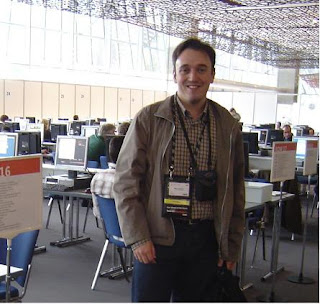Jeff Atwood posted a thought provoking (and controverse) post: Embracing Languages Inside Languages. In it he argues againts fluent interfaces (APIs that read like English), specifically two examples about SQL and regexes. I agree that those examples add complexity, verbosity and that trying to hide one's ignorance behind an API is not a solution (one of the commenters suggests replacing "a = (b + 1) * a ^ 2" with "a.valueOf(b.plus(1).times(a.pow(2))").
But I also see the power in fluent interfaces, specially in Domain Driven Design. Having a DSL defined on a specific domain, the use of a good fluent interface, could allow business experts to understand code (and ease the translation from the business domain to code). Redefining two clearly established DSLs - SQL and regular expressions - with a more verbose syntax, with new quirks, seems foolish. The stated advantadge of being fully OO, is just people trying to hide or cover the fact that they don't fully understand the syntax or the semantics of the language. The fact that it's more verbose, doesn't imply that it's more readable (to me it's quite the opposite, as I prefer terseness to verboseness). And if you don't understand a subject, instead of covering it up, admit that you are a terrible programmer like me, go out, buy a book (try Head First books, as they are really good to learn new & difficult topics) and master the topic.
People embrace ASP.NET (or JSP) programming without question, seeing it's advantadges, conciseness over hand generating HTML. The same happened with High Level Languages and Assembly or recently between VM languages (C# and Java) and native languages (C, C++).
So, I really don't understand people's aversion to SQL. It's one of the oldest, more popular and widely used DSLs. Yet it scares so many people, that is hidden or abstracted away. That way, it's true power is never realized (specially the set oriented paradigm, instead of row based).
It must be a human thing like the ones I read in the Dinosaur Programmers Know More Than You blog post. As we stick around and watch technology waves (I've been watching professionally for almost 10 years) we get to know "what programmers forget, screw up, hope won't happen, and ignore" because that's what we did. And we become "Dinosaur Programmers", because we see each new technology as it is (to us), not as it is marketed. And see it transform from the hype of the day (XML can be used everywhere, for everything is one of my favorites) to something usable, stable and mature. To end I must quote the great ending of the post, with which I deeply agree (emphasis added by me):
“
Every new technology sounds great, and is capable of great things when it's optimally applied. Which it almost never is. And nothing brings out the imperfections of a new technology like real world usage, in a mission critical environment, with money on the line.
So you'll forgive me when I don't get excited about your new framework/language/architecture/process that's going to change everything/usher in a new paradigm/launch the next Google. As long as people are writing code, and assembling component frameworks, and modeling the business processes, they're going to continue to forget, screw up, hope for the best, and ignore the vague and uncertain parts.
While a new technology might eliminate a whole species of software development errors, you'll just discover, and now have the opportunity to explore, a whole new jungle of failure.
Dinosaur programmers already know this, it's our home turf.
”

1 comment:
Louis Vuitton brings all the fabulously extravagant louis vuitton
into our lives, but which is the best lv
for you, it is one of the smaller louis vuitton bags
. The lv handbag
itself is classed as a city replica louis vuitton handbags
however you don't have to belong in the city to have this louis vuitton handbags
Post a Comment